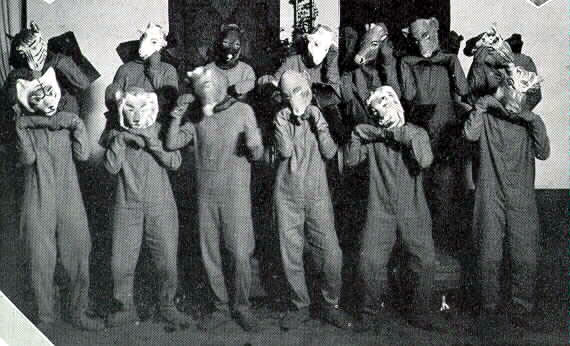Let’s let this be a place where we can start to respond to the material.
Having just begun to listen and read along, something I haven’t actually done with the material in a long time, I am gratefully reminded of the sad limits of conceptual thinking when set beside the magic of the verse (and the music, of course).
A few random observations. The task of the production with such material is to situate the audience’s attentiveness so that they can really listen to the words. The magic of the event is in hearing the verse, in the way the fanciful play of words conjures a larger realm. The stuff of the everyday is pulled into this transformative process. We want to hold a child’s attention and let the images, the play of thoughts and images and notions, blossom.
I can’t see the songs as ever being just background for something else. They are too rich, too dense. You can’t afford to miss anything. All stage craft and performance issues need to back up the songs. I don’t think we want the audience’s attention distracted with a question of “what just happened?”
The decision: do we create a presentation world with some kind of story frame, some reason for people to be gathered together doing the songs in some fashion; or a neutral container we fill with each song and we don’t assume a need to find framing movtivating impulses? Of course it doesn’t have to be either/or. That’s just one of the tensions we have to negotiate as we go.
From the titles of the songs on, I kept thinking about the songs as responses to a playful challenge, almost as if a child proposed each title and then expected the singers to rise to the challenge and invent. The songs as the result of a kind of high order imaginative game played by the children. Are the singing adults participants in the game or figures from some other realm conjured by the imaginative forces?
With this idea of each song being a deliberate challenge, I could see other elements (puppets, dance, scenic, etc) offering a kind of “musical” underscoring for each song, trying to tap into feelings and latent ideas. But I also thought, and I didn’t think I would find myself thinking this, all the stagecraft, all action, could attempt to quite literally meet the challenge of portraying the content of the songs. Two levels of playful challenge at work: the challenge of “composing” each song and then the challenge of rendering the imaginative improvisations in some kind of palpable form. I guess I’m thinking it’s more honest to imagine children attempting both things. Or children laying down the challenge to the “adult” of making something up (tell me a story) and then playfully taking the next step of trying to “make it real.”
But I don’t want to clog things up with too much conceptualizing…
I do think, however, that it might be inspirational to look into forms of late 18th century domestic children’s amusements. I wonder if the industrial clouds Blake saw on the horizon could be found reflected in a change in the kinds of toys and distractions available to children. But I’m not saying it’s necessarily a bad thing. Just wondering about what kind of “stuff to play with” might have existed. How did children and adults gather for amusement? The notion of “the poet” as a kind of convention for imaginative elaboration, a familiar narrative frame. “Father, could we go to Wm. Blake’s Inn this afternoon while Uncle Tim is visiting?” “Perhaps, child.” “I would like Mr. Blake to bake something in the kitchen?” “What?” “William Blake bakes a thundercloud pudding.” “Ah, hurumph, a thundercloud pudding, eh…alright, let’s see…hmmm…wait, don’t start clapping yet, I need to think…” “Come on, Uncle Tim, a thundercloud pudding, a thundercloud pudding, William Blake bakes a thundercloud pudding!” And so poor Uncle Tim would extemporize to the clapping rhythms of the children a rhyming verse fantasy in which the magical poet, Mr. Blake, would bake a thundercloud pudding, while the other children would playful respond to his words with the stuff around them, often successfully finding a way to portray it, and often collagpsing in laughter over the impossibility of “stoking the stove with stars plucked from Mars…”
